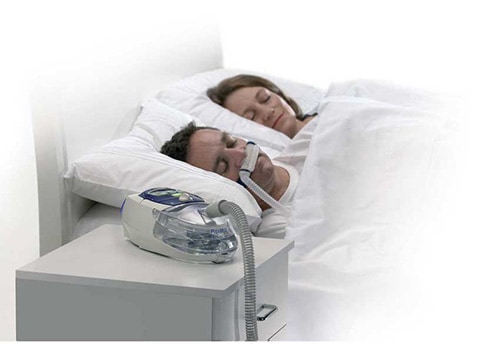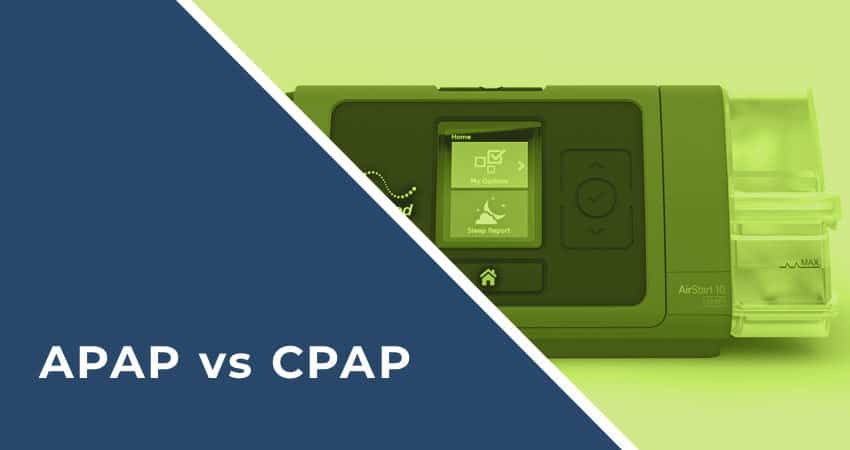Debating whether to use APAP vs. CPAP for your obstructive sleep apnea?
You are not alone. Most people find it hard to choose which machine is right for them since they’re unaware of the differences between the two.
Both continuous positive airway pressure (CPAP) and auto positive airway pressure (APAP) therapies deliver pressurized air to your airways to help you breathe.
But while CPAP machines are usually the first choice in treating sleep apnea, some people can’t tolerate them. That’s when doctors prescribe them with APAP therapy.
But how do you even know which one is better the choice for your needs? Read on as we explain the differences between APAP vs. CPAP.
Defining APAP Therapy vs CPAP Therapy
You’ve probably heard about CPAP machines more than APAP machines before, and that’s because a CPAP machine is the one that’s most commonly prescribed for sleep apnea patients.
It provides a fixed and continuous flow of oxygen into your airway as you inhale and exhale while sleeping.
CPAP machines usually come in the form of a small box with a built-in motorized fan, filter, humidifier, tube, and masks.
On the other hand, APAP machines, which are sometimes referred to as “self-adjusting CPAPs,” automatically adjust to the correct air pressure while you sleep. That means you don’t need to input anything or prompt it to change the pressure anymore.
APAP Therapy vs CPAP Therapy: The Difference
Based on the above definitions, you can already see the biggest difference between the two: the behavior of the air pressure.
CPAP only delivers a single fixed continuous pressure level of air. For most patients, CPAP is the only type of treatment they need, since CPAP pressure is optimally set for obstructive apneas.
Meanwhile, an APAP machine automatically adjusts its setting according to a specific person’s breathing needs.

APAP machine automatically adjusts its setting according to a specific person’s breathing needs
Remember that our breathing pattern changes throughout the night as we change positions and move in and out of different stages of sleep. The constant flow of pressurized air helps sleep apnea sufferers breathe freely throughout the night, leading to a good night’s rest.
But how does the APAP machine know how to make these automatic adjustments?
APAP technology monitors the present resistance in your breathing on a breath-by-breath level. It decreases pressure when the upper airway is stable and increases pressure during episodes of apnea, slow or shallow breathing, or snoring.
Compared to CPAP devices, APAP machines only deliver the exact amount of pressure that you need at the moment. Healthcare specialists and physicians often find APAP therapy to be more useful for patients with more complex sleep apnea conditions (such as REM-related apnea or positional apnea.
People who can’t get used to the standard CPAP therapy may also experience better results with the more sophisticated APAP therapy.
During the course of your treatment, your sleep technician or doctor may need to adjust the proper amount of pressurized air you need to keep your airways clear of obstructions and set your machine to that number.
Therefore, it’s more convenient to use an APAP machine that automatically adjusts to the pressure you need.
Cost Difference Between APAP vs CPAP Machines
Since APAP has a more sophisticated technology, the cost of an APAP machine is higher than CPAP’s cost. A CPAP machine normally costs between $500-$700, while an APAP machine costs around $900-$2000.
The APAP machine may be a better and more cost-effective device for long-term use. For most people, it’s a small price to pay for the comfort and convenience that an APAP machine offers, but for some, the cost of an APAP can be a huge barrier.
In most cases, patients who experience several changes in their breathing pattern during sleep choose APAP machines for their auto-adjustment settings.
Other patients who have had the same continuous issues over time have opted for CPAP machines. Some patients are just used to and generally do better with the continuous airway pressure from CPAP machines.
There are also patients who start with a CPAP machine and, after learning that the airflow does not manage their symptoms enough, switched to an APAP machine.
Still undecided? Here are the pros and cons of APAP vs.CPAP machines.
Pros and Cons of APAP Machines
PROS
- Auto-adjust mode for pressure levels based on sleep positions, colds, or seasonal allergies
- Increased comfort level during high-pressure apnea events
- Adjustable air pressure settings depending on weight loss or gain
- Accommodates mild alcohol consumption before bedtime as drinking can contribute to breathing changes
CONS
- Can go high by as much as $300 more than what you’d pay for a CPAP machine
- Slow pressure adjustment
- Not recommended for people with chronic heart failure, obesity, and hypoventilation syndrome
Pros and Cons of CPAP Machines
PROS
- More pleasant sleeping experience due to fewer disruptions and apnea events
- Lower stress levels
- More affordable than APAP machines
CONS
- Can leave some people feeling claustrophobic upon exhaling
- Fixed pressure setting
- Incorrect pressure settings can make you feel bloated
CPAP or APAP? It’s Up to You!
CPAP and APAP machines are both excellent therapies for addressing obstructive sleep apnea. Which is better for a particular patient depends on a variety of factors including:
- cost
- sleeping position
- variability and types of breathing obstructions
- other respiratory conditions like chronic obstructive pulmonary disease, allergies, or colds
- the need for pressure changes over a long period of time
If you’re having trouble which therapy to choose or just want to learn more about APAP, CPAP and other treatment options available, check out our recent blog posts and guides for more information.


